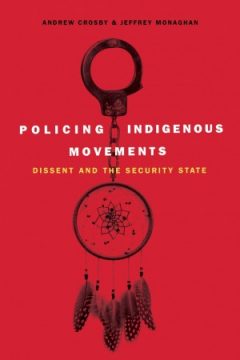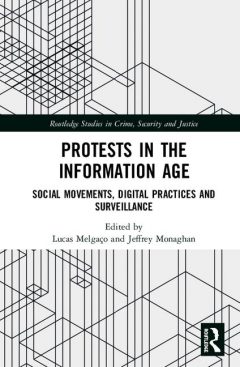Jeffrey Monaghan

Associate Professor/ Undergraduate Supervisor
- Ph.D. (Sociology), Queen’s University
- Email Jeffrey Monaghan
Research Interests
- Security governance
- Policing
- Surveillance of social movements
- Settler colonial studies
- Social movements studies
- Globalization of surveillance and security practices
About
Jeffrey Monaghan is an Associate Professor at Carleton’s Institute for Criminology and Criminal Justice (ICCJ). He has a PhD in Sociology from Queen’s University and serves on the Editorial Board of the interdisciplinary journal Criminological Encounters.
Jeff’s primary research interests examine how policing and surveillance practices intersect with systemic patterns of criminalization, social inequality, and colonial and racial social structures. Current research projects include:
- Protest policing & the policing and surveillance of social movements;
- Policing practices associated with national security, counter-terrorism, counter-radicalization;
- Police culture and police violence;
- Discretionary criminalization practices.
Jeff teaches three undergraduate courses at the ICCJ: Criminological theories (CRCJ 2100); Policing (in) security (CRCJ 3100), and The art of (in)justice (CRCJ 4500).
For graduate student supervision/committees, Jeff is cross-appointed to the Department of Sociology and Anthropology and the School of Canadian and Indigenous Studies.
Books
Disability Injustice: Confronting Criminalization in Canada (2022)
Edited by Kelly Fritsch, Jeffrey Monaghan, and Emily van der Meulen

Disability Injustice is an edited collection that brings together highly original work by a range of scholars and activists to explore disability in the historical and contemporary Canadian criminal justice system. The contributors confront challenging topics such as eugenics and crime control; the pathologizing of difference as deviance within criminal law systems; processes of criminalization based on discretionary, biased approaches to physical and mental health; and the role of disability justice activism in contesting longstanding discrimination and exclusion. Weaving together disability and sociolegal studies, criminology, and law, they examine disability in relation to various agencies and aspects of the criminal justice system. Policing and surveillance, sentencing and the courts, prisons and other carceral spaces, and alternatives to confinement are among the areas of focus.
Policing Indigenous Movements: Dissent and the Security State (2018)
With Andrew Crosby

In recent years, Indigenous peoples have lead a number of high profile movements fighting for social and environmental justice in Canada. In response, policing and other security agencies have developed a prolific surveillance regime that targets Indigenous movements as national security threats. Policing Indigenous Movements traces the colonial legacies of these practices, showing how the extensive policing of Indigenous peoples or groups in the “war on terror” has been rationalized by the development of categories and labels such as “Aboriginal extremism” and “critical infrastructure” specifically to criminalize Indigenous movements that challenge extractive development, demand self-determination, or contest federal and provincial claims to Indigenous lands.
Through an examination of four prominent movements — the long-standing conflict involving the Algonquins of Barriere Lake, the struggle against the Northern Gateway Pipeline, the Idle No More movement and the anti-fracking protests surrounding the Elsipogtog First Nation — this book raises critical questions regarding the expansion of the security apparatus, the normalization of police surveillance targeting social movements, the relationship between police and energy corporations, the criminalization of dissent and threats to civil liberties and collective action in an era of hyper surveillance.

Protests in the Information Age: Social Movements, Digital Practices and Surveillance (2018)
Edited with Lucas Melgaço, Vrije Universiteit Brussel
Information and communication technologies have transformed the dynamics of contention in contemporary society. Social networks such as Facebook and Twitter, and devices such as smartphones have increasingly played a central role in facilitating and mobilizing social movements throughout different parts of the world. Concurrently, the same technologies have been taken up by public authorities (including security agencies and the police) and have been used as surveillance tools to monitor and suppress the activities of certain demonstrators. This book explores the complex and contradictory relationships between communication and information technologies and social movements by drawing on different case studies from around the world.
Security Aid: Canada and the Development Regime of Security (2017)

Canada is actively involved through various agencies in the domestic affairs of countries in the Global South. Over time, these practices – rationalized as a form of humanitarian assistance − have become increasingly focused on enhancing regimes of surveillance, policing, prisons, border control, and security governance.
Drawing on an array of previously classified materials and interviews with security experts, Security Aid presents a critical analysis of the securitization of humanitarian aid. Jeffrey Monaghan demonstrates that, while Canadian humanitarian assistance may be framed around altruistic ideals, these ideals are subordinate to two overlapping objectives: the advancement of Canada’s strategic interests and the development of security states in the “underdeveloped” world. Through case studies of the major aid programs in Haiti, Libya, and Southeast Asia, Security Aid provides a comprehensive analysis and reinterpretation of Canada’s foreign policy agenda and its role in global affairs.
Recent Publications
| Ahmad, Fahad and Jeffrey Monaghan (2022). “Socializing the high policing métier: Exploring counterterrorism trainings for frontline workers.” Surveillance and Society. 20(3): 248-264. Available online: https://ojs.library.queensu.ca/index.php/surveillance-and-society/article/view/14859/10276 |
| Monaghan, Jeffrey (2022). “‘Uphold the Right’: Police, Conservatism, and White Supremacy.” In: Pasternak, Shiri, Abby Stadnyk and Kevin Walby (eds) Disarm, Defund, Dismantle: Police Abolition in Canada. Between the Lines Books. Pgs 12-19. |
| Monaghan, Jeffrey (2022). “Preforming counter-terrorism: Police newsmaking and the dramaturgy of security.” Crime, Media, Culture, 18(1) 21–39. |
| Abigail Curlew and Jeffrey Monaghan (2022). “#Endpoliceviolence: Non-Hegemonic Bodies, Police Violence, and Abolitionist Politics.” In: Fristch, Kelly, Jeffrey Monaghan, and Emily van der Meulen (eds) (2022). Disability (In)Justice: Examining Criminalization in Canada. University of British Columbia Press; Disability, Culture and Politics Series. Pgs 282-303. |
| Monaghan, Jeffrey and Valerie Steeves (2021). “Protesting Bill C-51: Reflections on connective action against big data Surveillance.” In Lyon, David and David Murakami Wood (eds.) Big Data and Surveillance. UBC Press. 218-235 |
| Ahmad, Fahad and Jeffrey Monaghan (2021). World of statues: The “war on terror,” memorialisation, and colonial violence.” Critical Studies on Terrorism, 14(4), 484-489. |
| Ahmad, Fahad, and Jeffrey Monaghan (2020). “From probabilities to possibilities: terrorism peace bonds, pre-emptive security, and modulations of criminal law.” Crime, Law and Social Change: 1-19, online first. |
| Nagra, Baljit and Jeffrey Monaghan (2020). “Security governance and racialization in the ‘war on terror’”. Contemporary Criminological Issues: Moving Beyond Insecurity and Inclusion. University of Ottawa Press, pgs 167-190. |
| Monaghan, Jeffrey, and Madalena Santos (2020). “Canada, the Palestinian Liberation Organisation (PLO) and the flexibility of terror identities.” Critical Studies on Terrorism, 13(2): 280-295. |
| Ahmad, Fahad and Jeffrey Monaghan (2019). “Mapping criminological engagement with radicalization studies.” British Journal of Criminology. |
| Howe, Miles and Jeffrey Monaghan (2018). “Strategic incapacitation of Indigenous dissent: Crowd theories, risk management, and settler colonial policing.” Canadian Journal of Sociology, 43(4):325-348. |
| Monaghan, Jeffrey and Kevin Walby (2018). “‘Hobocops’: Undercover policing’s deceptive encounters,” Criminological Encounters, 1(1): 7-20. |
| Monaghan, Jeffrey and Kevin Walby (2017). “Surveillance of Environment Movements in Canada: Critical Infrastructure Protection and the Petro-Security Apparatus,” Contemporary Justice Review, 20(1): 51-70. |
| Crosby, Andrew and Jeffrey Monaghan (2016). “Settler colonialism and the policing of Idle No More,” Social Justice, 43(2): 37-57. |
| Monaghan, Jeffrey and Adam Molnar (2016). “Radicalisation theories, policing practices, and ‘the future of terrorism?’,” Critical Studies on Terrorism, 9(3): 393–413. |
| Monaghan, Jeffrey (2016). “Security Development and the Palestinian Authority: An examination of the “Canadian Factor’,” Conflict, Security and Development, 16(2): 125-143. |
| Hoye, J. Matthew, and Jeffrey Monaghan (2015). “Surveillance, freedom and the republic.” European Journal of Political Theory. |
| Monaghan, Jeffrey (2015). “Four Barriers to Access to Information: Perspectives of a Frequent User,” in Brownlee, Jamie and Kevin Walby (eds) Access to Information and Social Justice in Canada. Winnipeg: Arbiter Ring. |
| Monaghan, Jeffrey (2015). “Criminal justice policy transfer and prison counter-radicalization: Examining Canadian participation in the Roma-Lyon Group,” Canadian Journal of Law and Society, 30(3): 381-400. |
| Monaghan, Jeffrey (2014). “Security Traps and Discourses of Radicalization: Mapping the Surveillance of Muslims in Canada,” Surveillance and Society, 12(4): 485-501. |
| Monaghan, Jeffrey (2013). “Mounties in the Frontier: Circulations, Anxieties, and Myths of Settler Colonial Policing in Canada,” Journal of Canadian Studies, 47(1): 122-148. |
| Monaghan, Jeffrey (2013). “Settler Governmentality and Racializing Surveillance in Canada’s North-West,” Canadian Journal of Sociology, 38(4): 487-508. |
| Monaghan, Jeffrey (2013). “Terror Carceralism: Surveillance, (in)Security Proliferation, and de/Civilization,” Punishment and Society, 15(1):3-22. |
| Cochrane, DT and Jeffrey Monaghan (2013). “‘A Degree of Control’: Corporations and the Struggle Against South African Apartheid,” in Di Muzio, Tim (editor) The Capitalist Mode of Power: Critical Engagements with the Power Theory of Value. Routledge/RIPE: Studies in Political Economy. |
| Monaghan, Jeffrey and Kevin Walby (2012). “‘… They Attacked the City’: Security Intelligence, the Sociology of Protest Policing, and the Anarchist Threat at the 2010 Toronto G20 Summit,” Current Sociology, 60(5): 653-671. |
| Crosby, Andy and Jeffrey Monaghan (2012). “Settler Governmentality and the Algonquin of Barriere Lake,” Security Dialogue 43(5): 420-437. (Special Issue: Governing (in)Security in the Post-Colonial World). |
| Monaghan, Jeffrey and Kevin Walby (2012). “Making up ‘Terror Identities’: Security Intelligence, Canada’s Integrated Threat Assessment Centre, and Social Movement Suppression,” Policing and Society, 22(2):133-155. |
| Monaghan, Jeffrey and Yavar Hameed (2012). “Accessing Dirty Data: Methodological Strategies for Social Problems Researchers,” in Brokering Access: Politics, Power and Freedom of Information in Canada, (eds.) Larsen, Mike and Kevin Walby. Vancouver: UBC Press, pp142-168. |
| Monaghan, Jeff and DT Cochrane (2012). “Fight to Win! Empiricizing Political-Economic Disruption Campaigns,” in An Economy of Sustainability: Anarchist Economics (eds.) Nocella, Anthony J. II, Deric Shannon, and John Asimakopoulos. Oakland: AK Press, pp 95-116. |
| Walby, Kevin and Jeffrey Monaghan (2011). “‘Haitian Paradox’ or Dark Side of the Security-Development Nexus? Canada’s Role in the Securitization of Haiti, 2004-2009,” Alternatives, 36(4): 273-287. |
| Walby, Kevin and Jeff Monaghan (2011). “Private Eyes and Public Order: Policing and Surveillance in the Suppression of Animal Rights Activists in Canada,” Social Movement Studies, 10(1): 21-37. |
| Walby, Kevin and Jeff Monaghan (2010). “Policing Proliferation: The Militarization of Police and Atomic Energy Canada Limited’s Nuclear Response Forces,” Canadian Journal of Criminology and Criminal Justice, 52(2): 117-145. [J1]http://www.criminologicalencounters.org/ [J2]http://www.sscqueens.org/ |